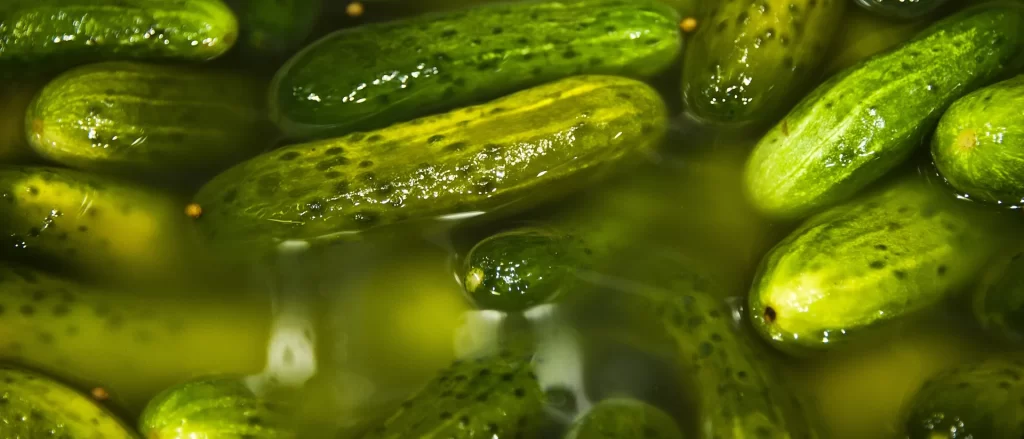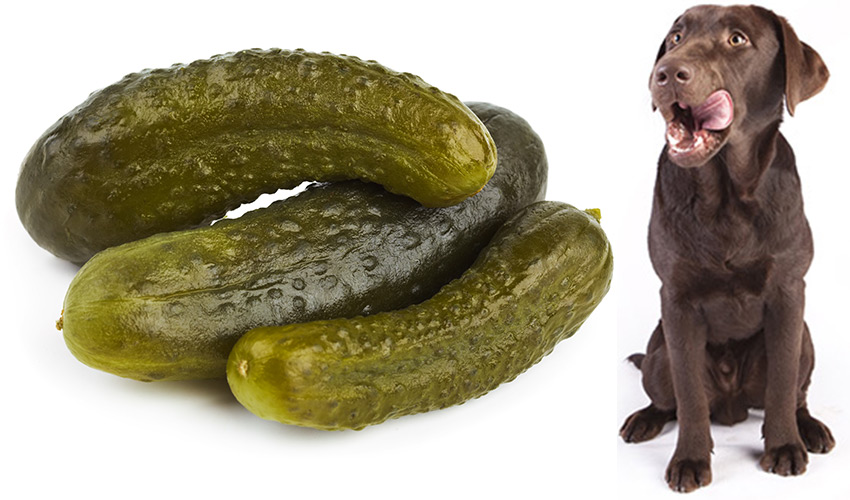Pickles are a popular food item in many countries, many people like to eat and share some dogs with them when eating, but can dogs eat pickles?
What Are Pickles?

Pickles are cucumbers that have been preserved in vinegar and spices. They are often sliced and served as a condiment or snack. Pickles are a popular food item in many countries and have been enjoyed for centuries.
The process of making pickles involves soaking the cucumbers in vinegar, salt, and spices, which preserves them and gives them their characteristic flavor.
Pickles originated more than 4000 years ago when ancient Mesopotamians began to soak cucumbers in acid salt water as a way to preserve cucumbers. Since then, they have been the staple food in the global culture, famous for their enthusiasm, health benefits, and delicious food.
What Kind of Pickles are There?

There are many different types of pickles, including dill pickles, sweet pickles, bread and butter pickles, and more.
Dill pickles are made with dill weed and dill seed, which give them their characteristic flavor.
Sweet pickles are made with sugar and are often served as a condiment or accompaniment to savory dishes.
Bread and butter pickles are made with sweet onions and served as a condiment on sandwiches or hamburgers.
In addition to these popular types of pickles, there are many other varieties, such as spicy pickles, sour pickles, and fermented pickles, to name a few.
Can Dogs Have Pickles?

Dogs are not typically able to eat pickles due to the vinegar and spices used to make them. These ingredients can be harmful to dogs and can cause digestive upset. In addition, pickles are often high in salt, which can be dangerous for dogs to consume in large amounts.
It’s best to stick to dog-friendly treats and foods to keep your pet healthy and happy. If you’re unsure about what foods are safe for your dog to eat, it’s always a good idea to consult with your veterinarian for advice.
Dogs are omnivores, which means they can eat a variety of foods, but not all human foods are safe for them to consume. It’s important to be cautious about what you feed your dog to ensure its health and well-being.
4 Reasons Pickles is Bad for Your Dog’s Health!
Pickles contain a lot of salt.
High sodium is particularly problematic for dogs with underlying diseases and may lead to greater problems. Ingesting large amounts of sodium in a short period can lead to side effects, such as excessive drinking, vomiting, diarrhea, imbalance, and seizures.
Pickles may have spices or pepper.
Even if the spices or pepper used in pickles are not toxic to your dog, their stomach may not be accustomed to the spicy flavor, leading to digestive issues. The spices and pepper in pickles can irritate a dog’s digestive system and may cause stomachs upset such as vomiting and diarrhea.
Pickles may Contents Onions and garlic.
Onions and garlic are common pickling ingredients, but they are not safe for dogs. Onions and garlic belong to the allium family of root vegetables, which includes leeks, scallions, and chives. These vegetables contain a toxic compound called n-propyl disulfide, which can damage red blood cells in dogs and cause hemolytic anemia.
It may have white vinegar.
Vinegar has no nutritional value for your dog. It can stress their kidneys and cause stomach upset and diarrhea. But if your dog gobbles up a dropped pickle, the chances of that happening are slim.
What should I do if my dog eats pickles?
If your dog eats only one or two pickles, don’t be nervous. Check what type of pickle your dog ate and contact your veterinarian.
Depending on the amount and type of pickles you eat, your veterinarian may recommend taking your puppy to the hospital to ensure safety.
If your dog eats a lot of pickles, it is important to monitor them for any signs of disease. Pickles may be harmful to dogs because the vinegar and spices it uses can cause indigestion. Symptoms of indigestion in dogs may include vomiting, diarrhea, loss of appetite, and lethargy.
If your dog has any of these symptoms, contact your veterinarian immediately. Your veterinarian will be able to advise on how best to take care of your dog and may suggest treatments, such as using fluids or drugs to help with nausea and vomiting.
In severe cases, hospitalization may be required. In any emergency, it is best to keep the contact information of the veterinarian at hand.
What is the alternative food for pickles?

If you’re looking for foods similar to pickles but safer for your dog to eat, there are a few options you can consider.
- Give your dog cucumbers that have been sliced and treated with a small amount of vinegar and spices. It will provide a similar texture and flavor to pickles without harmful ingredients.
- Or give your dog a dog-friendly treat that has a similar flavor profile, such as a dill-flavored dog biscuit or a sweet potato chew. It is safe for dogs to eat and can provide a tasty and satisfying alternative to pickles.
As always, it’s important to consult with your veterinarian before feeding your dog any new foods to ensure they are safe and appropriate for your pet.


